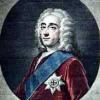Lord Chesterfield

Lord Chesterfield
Philip Dormer Stanhope, 4th Earl of Chesterfield KG PCwas a British statesman, and a man of letters, and wit. He was born in London to Philip Stanhope, 3rd Earl of Chesterfield, and Lady Elizabeth Savile, and known as Lord Stanhope until the death of his father, in 1726. Educated at Trinity Hall, Cambridge, he subsequently embarked on the Grand Tour of the Continent, to complete his education as a nobleman, by exposure to the cultural legacies of Classical antiquity and...
laughter men shining
It is by vivacity and wit that man shines in company; but trite jokes and loud laughter reduce him to a buffoon.
happiness laughter joy
Frequent and loud laughter is the characteristic of folly and ill manners.
witty laughter people
Observe it, the vulgar often laugh, but never smile, whereas well-bred people often smile, and seldom or never laugh. A witty thing never excited laughter, it pleases only the mind and never distorts the countenance.
laughter mind ill
In my mind, there is nothing so illiberal, and so ill-bred, as audible laughter.
horse fun laughter
Horse-play, romping, frequent and loud fits of laughter, jokes, and indiscriminate familiarity, will sink both merit and knowledge into a degree of contempt. They compose at most a merry fellow; and a merry fellow was never yet a respectable man.
laughter laughing people
The vulgar only laugh, but never smile; whereas well-bred people often smile, but seldom laugh.
fashion laughter silly
Loud laughter is the mirth of the mob, who are only pleased with silly things; for true Wit or good Sense never excited a laugh since the creation of the world. A man of parts and fashion is therefore often seen to smile, but never heard to laugh.
ancestry breeding brute good scholar soldier
The scholar without good breeding is a nitpicker; the philosopher a cynic; the soldier a brute and everyone else disagreeable.
attention contempt due inside man proper relation
Due attention to the inside of books, and due contempt for the outside, is the proper relation between a man of sense and his books.
alone athletes manners mind necessary oil prepare strength
Prepare yourself for the world, as the athletes used to do for their exercise; oil your mind and your manners, to give them the necessary suppleness and flexibility; strength alone will not do.
almost man woman
Every man is to be had one way or another, and every woman almost any way
account admitted ask company considered dances deep drink esteem exclude great ideas invite joking merit merits plays respected sake sings sought whoever
Whoever is admitted or sought for, in company, upon any other account than that of his merit and manners, is never respected there, but only made use of. We will have such-a-one, for he sings prettily; we will invite such-a-one to a ball, for he dances well; we will have such-a-one at supper, for he is always joking and laughing; we will ask another because he plays deep at all games, or because he can drink a great deal. These are all vilifying distinctions, mortifying preferences, and exclude all ideas of esteem and regard. Whoever is had (as it is called) in company for the sake of any one thing singly, is singly that thing, and will never be considered in any other light; consequently never respected, let his merits be what they will.
abound anger feeling forgiveness forgiving incapable minds pleasure vicious
Little, vicious minds abound with anger and revenge, and are incapable of feeling the pleasure of forgiving their enemies.
error innocent man mind people regard woman
If a man has a mind to be thought wiser, and a woman handsomer than they really are, their error is a comfortable one to themselves, and an innocent one with regard to other people